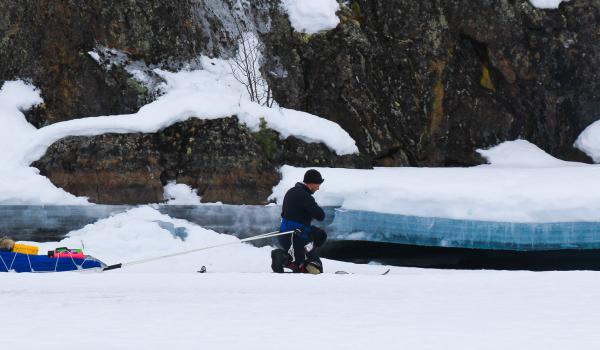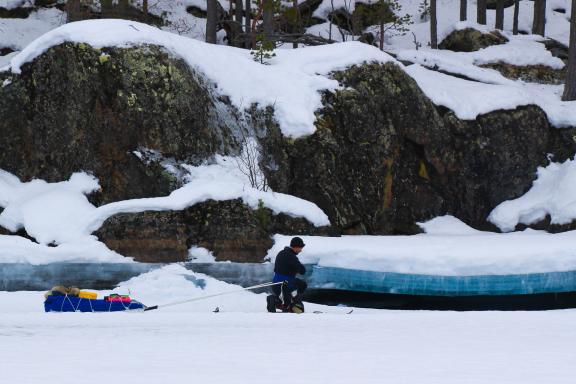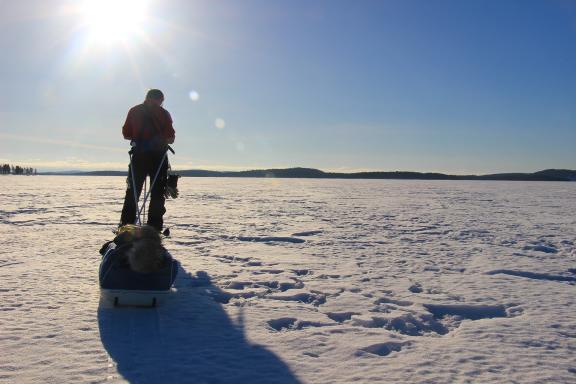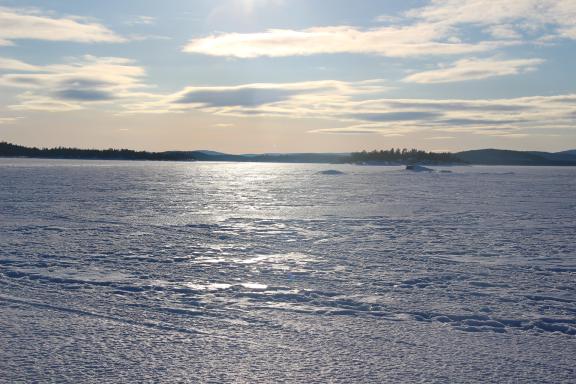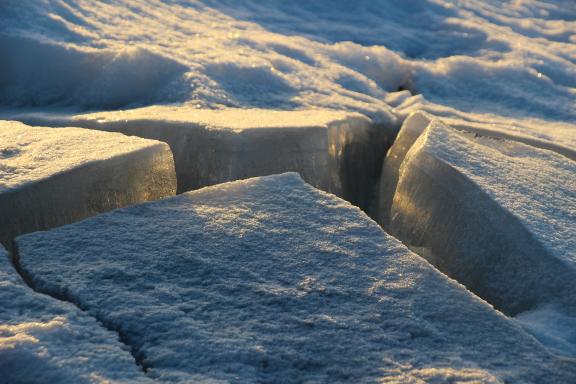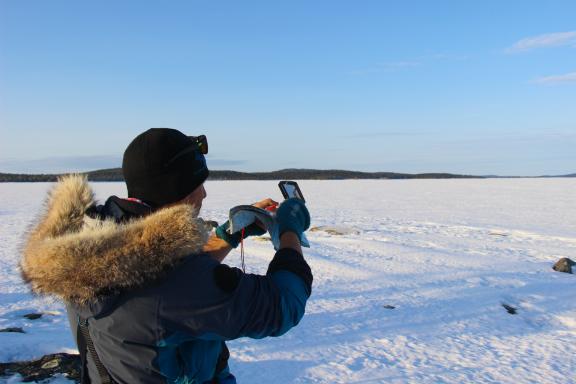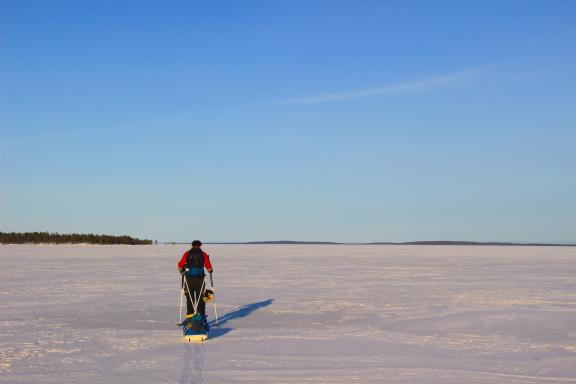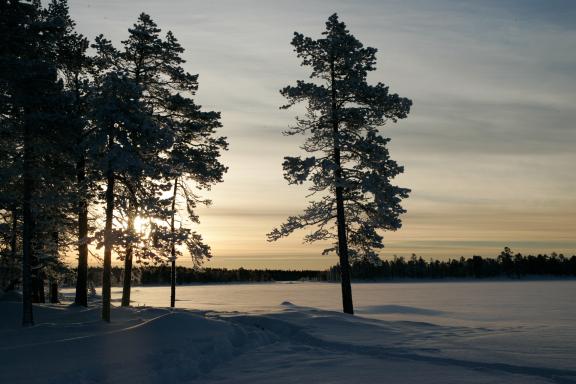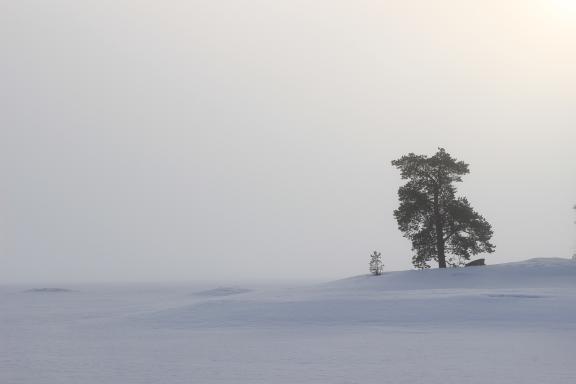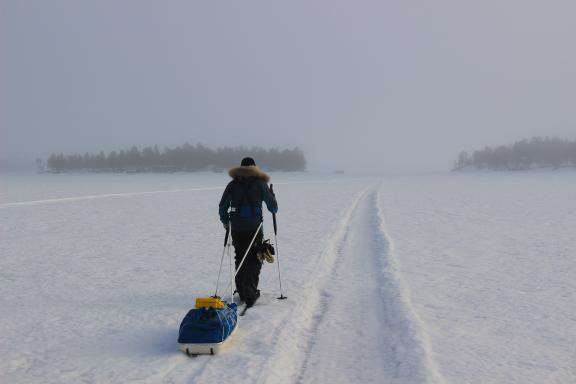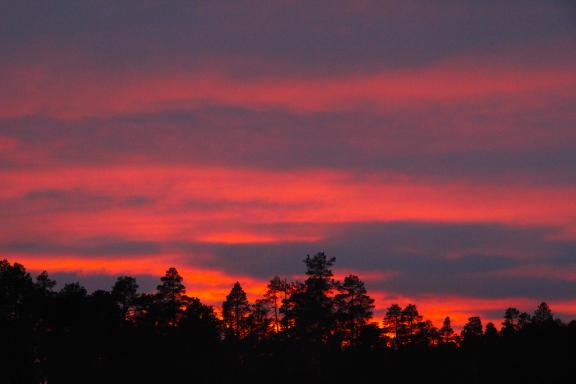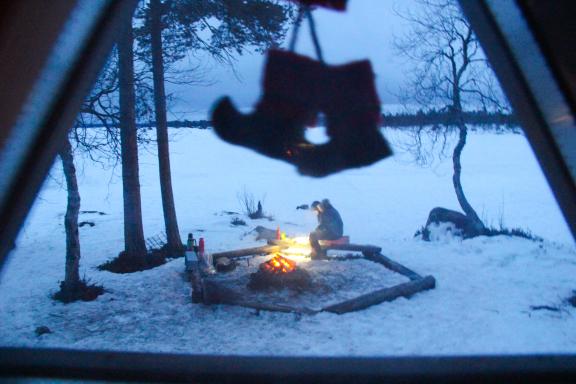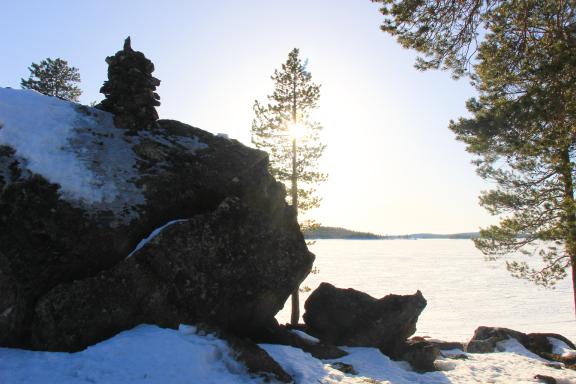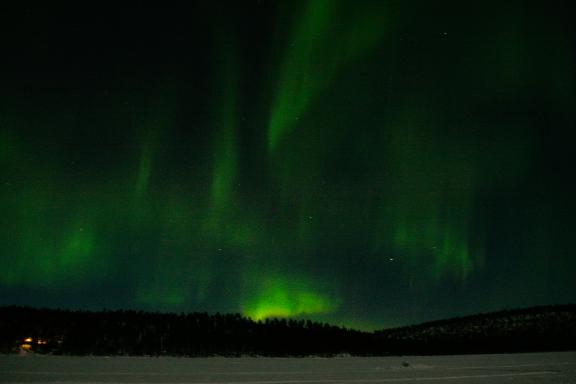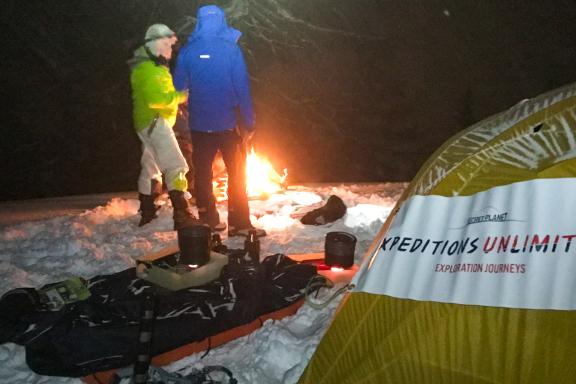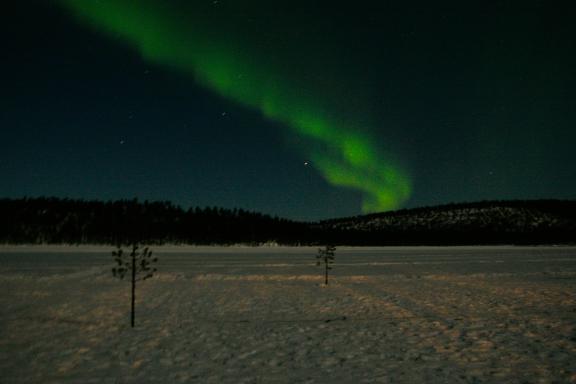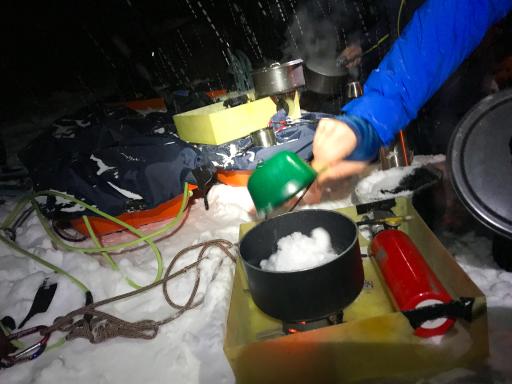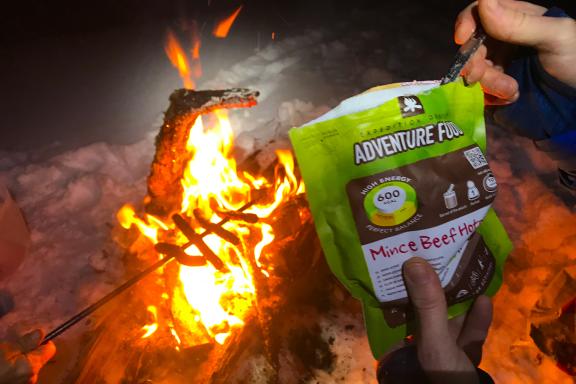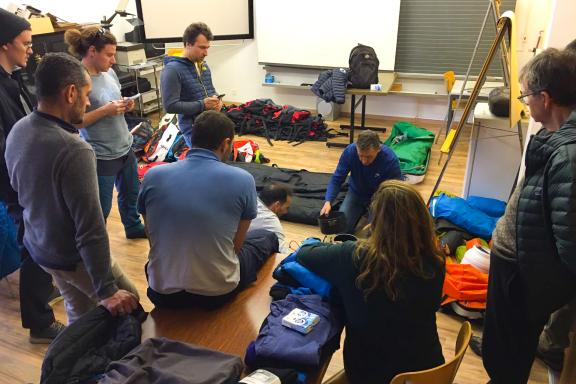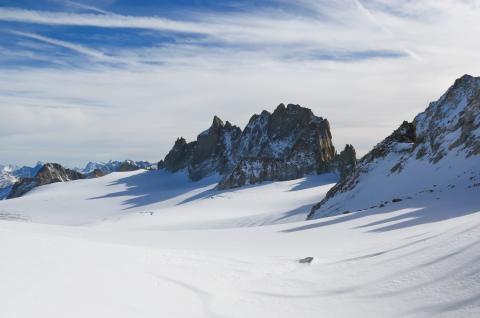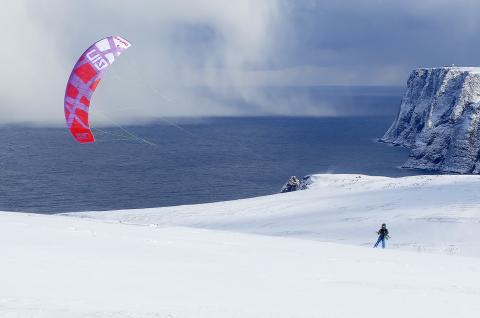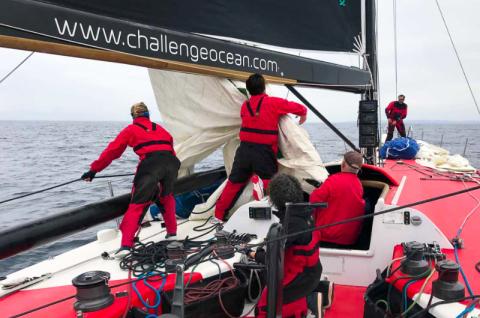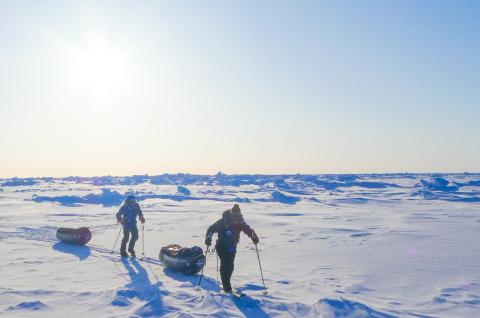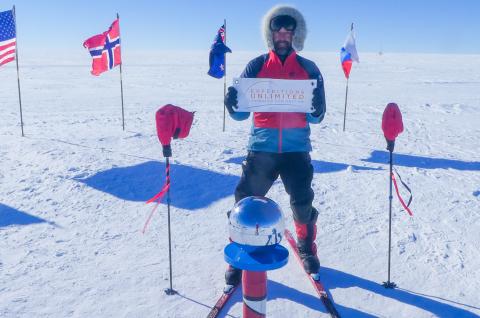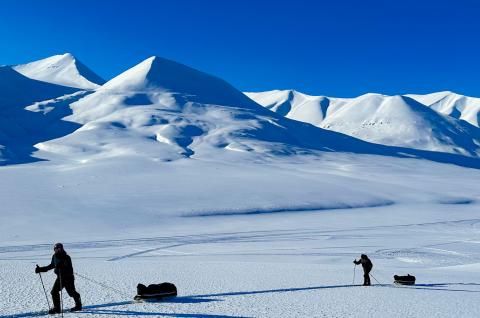Training course and preparation for polar expeditions
Highlights
- French-speaking experienced polar guide
- 1 day of preparation and theory
- 5 days Nordic backcountry skiing
- Real immersion in polar conditions
- Training in self-sufficiency on expeditions
- Magnificent wilderness environment
- H24 weather forecast services and medical hotline
- Small groups of up to 6 participants
Accompanied by an experienced polar guide, we set off on an itinerant tour of Lake Inari by ski manhauling, with a maximum of six participants. This short stay has been conceived as a mini expedition in itself, to acquire the basics of autonomy in the polar environment, preparing us for our future, more committed expeditions. After checking our equipment, preparing our pulkas and being briefed by our guide, we set off the next day on a human adventure that demands real team spirit. The cold can be intense in March. We adapt to the weather and current temperatures, to the state of the snow and ice, and to our state of fitness. We enjoy magical moments of silence and purity on the lake. We sleep in bivouacs under the northern lights. Good physical condition is the minimum requirement. All in all, a real apprenticeship in self-sufficient polar expeditions.
Descriptif
Educational expectations for the week
Although our expedition should first and foremost provide us with pleasure and beauty, we have conceived this stay as a true theoretical and practical initiation to autonomous polar expeditions. So, throughout the week, on site, and especially on the second day at our accommodation, we will be covering a number of concepts that we feel are essential for anyone wishing to venture into this extraordinary environment. It is clear, however, that we will not be able to cover all these topics in detail in such a short space of time. This theoretical input will enable all participants to develop their understanding of the essential prerequisites for polar expeditions, which they will then be able to usefully develop during this week and in their future polar experiences.
The week's teaching objective is to help you progress in the following areas:
- Polar environment
- Expedition preparation
- Expedition: orientation and progress
- Expedition: camp management
POLAR ENVIRONMENT
To immerse ourselves in these unknown lands, we begin by looking at their geography, the limits of the icy Arctic Ocean and the territories of Antarctica. We take a closer look at the characteristics of the polar environment, the climate and the best times for expeditions, the aurora borealis and biodiversity, the characteristics of human activity (our own) above 66° North and the logistics of getting there and staying for a few days to a few weeks. On the second day, we briefly cover the following topics:
- recognizing the type of ice we are dealing with according to its color, age and density;
- how to regulate body heat according to different levels of cold tolerance;
- characteristics of different modes of progression: unassisted (ski pulka) and assisted (kite sail;
- understanding the risks of prolonged exposure to the cold, including hypothermia, frostbite, eye, hand and foot problems;
- progressing in poor visibility and/or difficult terrain, especially thin ice and wide stretches of open water;
- extreme weather conditions;
- encounters with the polar bear, an animal with a keen sense of smell and a naturally inquisitive nature!
PREPARING FOR THE EXPEDITION
On the second day at our accommodation and throughout the week, during our expedition, during our breaks or at the bivouac, we will discuss :
- physical condition, physical and mental preparation ;
- diet and daily rations, balance of essential nutrients, water ;
- clothing: four insulating layers that retain the heat produced by a body in action, shoes, gloves, head, face;
- knowledge of our individual equipment: choice of skis and skins, pulka according to criteria of functionality, comfort, weight, harnesses and ropes;
- knowledge of our collective equipment: tent, stove;
- safety: firearms, beacon, GPS, satellite phone, expedition weather, Ifremmont medical hotline.
EXPEDITION: ORIENTATION AND PROGRESSION
During this week, we will be looking at orientation in the polar environment, route choice and progression techniques:
- staying on course and orientation with GPS, compass, sun, shadows, watch;
- choosing routes in difficult terrain, in areas of compression, ice blocks, bypassing or crossing open water;
- navigating according to weather conditions, especially precipitation and wind, and limited visibility;
- progression techniques with a loaded pulka;
EXPEDITION: CAMP MANAGEMENT
Finally, during this week we will be looking at setting up camp, with several options depending mainly on the number of participants, the weather and the environment in which we find ourselves:
- choose the camp site and the orientation of our tent;
- taking out and putting up our tent according to wind conditions, emergency shelter ;
- stove lighting and safety ;
- watch duty
Jour par jour
Day 1: Arrival at Ivalo and welcome by our guide
Day 1
Depending on your flight schedule, our guide will meet you at Ivalo airport and transfer you to your accommodation. The small village of Ivalo is located in the far north of Finland. Ivalo is the administrative and commercial center of the municipality of Inari, the largest in Finland. Not far away, Lake Inari is the third largest lake in Finland and the largest in Lapland. Once the site of a Sami sacrificial cult, this majestic body of water is enveloped in an enchanting atmosphere. The backdrop for the region is set!
We get to know all the participants. Our guide gives us a brief outline of the week's activities. If necessary, we do some additional food shopping, then share a convivial dinner at our accommodation before going to bed
Day 2: Polar environment and expedition preparation
Day 2
Today we are sedentary, but our day is going to be particularly full! With a good morning coffee in hand, our guide re-explains our week's objectives, and then we begin to tackle the points that are best seen quietly in the warmth, among them (more details above or opposite):
- Polar environment
- Expedition preparation
- Expedition: orientation and progress
- Expedition: camp management
Then we devote the whole of this afternoon, and a little of tomorrow morning if necessary, to preparing our expedition, covering the main notions of safety (weather, cold, stoves):
- Review of individual equipment: sleeping bag, personal protection depending on the weather, mattress and all other important equipment, possibly leaving anything superfluous at the accommodation to stay as light as possible;
- Review of collective equipment: tent, stove, cooking gear, etc.
Collective equipment is then shared on the basis of two participants per tent. We check each individual piece of equipment to avoid any nasty surprises once we are on the field.
Finally, we prepare the daily food rations, taking into account calorie requirements, for the next 5 days.
Days 3 to 6: Pulka skiing on lake Inari
Day 3
This morning, after breakfast, we finish our expedition preparations and load our skis, bags and pulkas into the vehicle that will take us to the starting point of our adventure. Depending on the size of the group, two rotations may be necessary.
For the next five days, we will be progressing in total autonomy in the magnificent environment of Lake Inari. We benefit from the same weather forecast services as on a more ambitious expedition, to familiarize ourselves with the daily rituals of the polar environment: azimuth, distance and duration of progress, time to set up and defend the bivouac, if necessary.
We cover an average of 15 and 20 kilometers a day, less on the first and last days, more if the group is particularly dynamic. We progress at our own pace, without forcing ourselves, slowly at first, then building up to feel the fatigue and emotions of the expedition. At the scheduled time and/or site, always depending on the weather, we stop to set up our bivouac.
As the week progresses, we find a pleasant routine in our movements and in the distribution of different tasks. In the morning, we take the time to get ready: just long enough for enough snow to melt for our breakfast, so that we are as rehydrated as possible. Everything we do takes much longer than usual. We wear gloves to handle our equipment. The beauty of Lake Inari transports us and gives us the energy to get moving. As we leave our camp, we try to erase all signs of our presence, out of respect for nature and for those who might follow us. At the end of the day, we also settle into our routines, setting up our tents, starting the stove in safety, heating the water, preparing our meal, then slipping into our sleeping bag for a restorative night’s rest.
Overwhelmed by the beauty of the environment we pass through, the photographers among us discover new angles, colors and nuances. At times, we may attach our pulka to the harness of another traveler in the group, volunteering (!) to take the time to photograph. The cold invites us in every way to be on the move to warm up, especially our extremities. In this way, the group's progress is balanced and we can all take regular breaks together. We need to drink regularly and eat to keep our digestive systems in top shape.
Day 7: Last day of expedition
Day 7
Today we finish our expedition and return to Ivalo by mid-afternoon. We see the first signs of human life, which gives us renewed energy for the last few kilometers. The smells so typical of human life are beginning to tease us and give us a renewed desire to find something to eat and drink. The fatigue of the first few days has disappeared like snow melting in the sun.
We load our pulkas, a little lighter than a few days earlier, and set off for our accommodation. Once there, we unload our gear and dry what needs drying. This evening our guide invites us to the restaurant to celebrate the end of this magnificent week, during which we have learned and progressed so much.
When we untie the pulkas from our harnesses and return to the showers at our accommodation, there's no better feeling than warm water on the skin. There are no words for it... sleeping in a cosy bed!
Day 8: Departure day
Day 8
In the morning, we finish cleaning, repairing (if necessary!) and putting away the collective equipment. We pack our personal belongings and head for the airport for our return flight.
FIN PROGRAMME
For reasons that cannot be foreseen at this stage, such as unpredictable weather, the physical fitness or lack of fitness of participants or other circumstancess (customs formalities, road conditions, traffic, landslides, force majeure, etc.), your expedition leader may have to adapt the program, if necessary, to ensure the smooth running of your trip. He remains the sole judge and the one who guarantees your safety. Activity times are given as an indication and may vary from one participant to another.
The itinerary for all our expedition programs, or the ascent program for our high-mountain expeditions, are given here as a guide only. They are flexible enough to adapt to weather conditions with a few contingency days. In any case, you should follow the recommendations of your guide, who may suggest that you cancel your expedition due to weather, safety or physical conditions.
It is important to remember that this is a truly unsupported expedition, and that anything can happen. Expeditions Unlimited, your expedition leader, your guide or our local teams can in no way be held responsible.
Any costs incurred as a result of a change in the expedition schedule (extra nights' accommodation, extra flights) will be borne by the participants and not by the organizers. "Contingency days" refer to the expedition in the strict sense of the term (base camp/base camp in the mountains, departure point/exit point on a traverse, etc.).
Any early return of the expedition or of certain members only (early success, abandonment, etc.), generating costs for accommodation, meals, changes to air tickets or other activities not provided for in this program, will be charged in full to the participants.
Infos Techniques
Accompagnement
Your expedition leader is Manu Poudelet, an English-speaking polar guide from the Polar Experience team (see description above), highly experienced in polar environments and group management.
He/she represents Expeditions Unlimited in dealings with the group, our partners and local authorities. He/she takes the decisions necessary for the expedition to run smoothly. His authority is decisive and unquestionable. You must respect his or her decisions, as well as those taken collectively.
If, for reasons beyond our control, our planned guide is unable to lead the group, he will be replaced by another experienced polar guide. The services would not be modified, the conditions of the trip would be identical and this change would not constitute a valid reason for cancellation.
And throughout the program, we will rely on other local skills as required. Finally, we will have access to weather forecast services and an Ifremmont doctor, a specialist in cold and isolated environments, on a 24-hour hotline.
For unpredictable reasons at this stage, like adverse weather conditions, insufficient physical condition of participants, insufficient competencies of participants related to the intended activities, your guide may decide to adjust the intended program and/or activities. At all times, his decision will be final on all matters likely to affect the safety and well-being of the trip.
Niveau de difficulté
Level rated: challenging
This program is designed for participants who take part in a regular sports activity several times a week, including endurance activity.
This expedition requires good physical and mental condition. We are on our own for 5 days, in conditions of isolation and extreme cold (-20°C and exceptionally down to -30°C). The weight of the loaded pulkas should not exceed around thirty kilos, so they are pretty light when you consider that on a thirty-day expedition, they can reach 50 or 60 kilos at the start, or even over a hundred kilos on a solo polar expedition.
Each participant is responsible for safety rules, equipment and maintenance, setting up camp and preparing meals. As always in this type of project, the key to success is teamwork and team spirit.
Programme sans aérien
We meet you in Ivalo. You will be welcomed by your guide at the airport. To make the most of your trip, we recommend arriving and departing in the early afternoon. Airlines available: Air France, Transavia, Finnair, Lufthansa.
Given the diverse origins of the participants on this trip, international outward and return flights are not included in this package. In most cases, we book flights on your behalf to ensure that the whole group arrives at the destination at the same time. We do not charge any fees for these air bookings. Please do not hesitate to contact us. If you book your own tickets, we will advise you on the ideal flight schedule to enable all participants to arrive within a reduced time frame. At the very least, you need tickets that can be modified.
HÉBERGEMENT
As indicated in the program, accommodation is in chalets or lodges on days 1, 2 and 7, in shared rooms, from two to four per room depending on the accommodation. Nights are spent in two-person tents during the expedition.
REPAS
Breakfasts, lunches and dinners are taken at your accommodation and are prepared collectively, except on the last evening when your guide invites you to a restaurant. During the expedition, meals are prepared in advance in the form of freeze-dried rations and other snacks. They provide us with all the calories we need for the expedition, with the emphasis on balance, weight and ease of preparation.
TRANSFERT TRANSPORT
Transfers are by private vehicle.
COM GROUP SIZE
The group is composed of 4 to 6 participants maximum. The number of participants is deliberately limited to allow for greater immersion, to avoid embarrassing our hosts, and to develop freedom and flexibility. However, the maximum number may be exceeded if the last person to register wishes to travel with one or more other people. The services will not be modified, and the conditions of the trip will remain the same.
Équipement
All logistical equipment is provided, including tents and pulkas, as well as collective equipment such as stoves, gasoline, etc.
Your guide is equipped with a satellite phone, other telecommunications and emergency equipment, and a geolocation beacon.
We also provide, free of charge, the -20°C extreme-cold sleeping bag, air mattress and foam mattress.
Other personal equipment is not supplied. A complete list is provided below.
Nos engagements pour un développement durable
Our commitment to a better planet has been a reality since the beginning of our story but we always need to do more and better. Please find out more about our charter and our commitments in terms of sustainable development. We have drafted our charter and take action through six themes on which we act as concretely as possible, most often with you: social equity and cultural respect, preservation of water, waste management in expedition, protection of biodiversity, raise public awareness on these subjects and finally, the optimization and recovery of CO2 emissions.
Regarding carbon emissions, most of which are due to air travel, we calculated and communicated in 2018 on the carbon footprint of each of our programs, expressed in tonnes of CO2.
And in 2022, we have set ourselves a carbon reduction target that we believe is unprecedented in the tourism industry, aiming to reduce the total emissions of our activity by 5% per year, taking 2019 as the reference year (3,430 tonnes of CO2). This commitment is in line with the trajectory of the Paris climate agreements of 2015, the current benchmark. By 2030, we aim to not exceed 2,160 tons of CO2. In 2024, all Secret Planet journeys emitted 2,064 tons, well below our maximum limit of 2,940 tons. The ceiling for 2025 is 2,800 tons, and in 2026 it will be further reduced to 2,660 tons. And so on until 2030. To find out more about all of our calculations and our commitments in terms of reducing our carbon emissions.
In addition, since 2019, we have been encouraging you when you book for your journey to contribute with a donation to an independent NGO, among the two we have selected that share the commitments made in our charter. We matched the amount of this donation to this program's carbon footprint. Thus, the journey you are considering generates 0,81 tons of CO2, which corresponds to a 100% donation of €24 for an estimated value today of €30 per tonne of CO2. This donation remains of course optional and you can decide to give between nothing and 100% of this amount. Since 2019, including covid years of 2020 and 2021, we have been able to collect thanks to you nearly €5,500 for these associations.
Please do not hesitate to come back to us with any questions you might have regarding this carbon footprint mechanism, our other sustainable développement commitments or even to share with us your experience through a chat or a mail at contact@secret-planet.com.
Manu Poudelet, IPGA polar guide
Manu supervises our polar ski-pulka expeditions in Scandinavia and Greenland, the Arctic Circle Trail and the West-to-East crossing in particular.
A firefighter and nurse, Manu has developed highly appreciated human and leadership qualities. He has built up his experience in Canada, Svalbard, Iceland and Antarctica on the Belgian Princess Elisabeth Station, where he goes every year.
Manu is a certified IPGA - International Polar Guide Association - guide.
In addition to his polar experience, Manu has developed considerable expertise in expedition logistics, which we regularly put to good use for privatized groups. Manu is a member of the Polar Experience team, founded by Dixie Dansercoer and now managed by Julie Brown.
Dates et Prix
Please find below all dates and prices for this expedition. Prices are quoted "from" and may be adjusted notably according to the number of participants (see trip notes for details). Please note that dates and prices for years beyond 2024, when given, are for guidance only and are subject to change and readjustment to take account of current economic realities.
No date works for me!
I initiate a new dateLE PRIX COMPREND
- Accommodation in a chalet or lodge in Ivalo for up to 3 nights
- Collectively cooked meals in Ivalo at our accommodation for up to 2 days
- Dinner at restaurant on last day
- Transfers airport/accommodation and accommodation/expedition
- Highly experienced polar guide
- Freeze-dried rations during the expedition
- Tents for two, stoves and fuel
- Pulkas and harnesses, mattress and cold-weather sleeping bag
- Safety satellite phone and geolocation beacon (reserved for guide)
- Taxes and permits
- Weather forecast services during the expedition
- Medical follow-up by Ifremmont during the expedition (see above)
- Remote online preparation meetings
LE PRIX NE COMPREND PAS
- International return flight to Ivalo and excess baggage
- Consular fees and health tests (Covid)
- Any customs taxes upon arrival from Finland
- Import taxes on satellite telephones, professional communications equipment and commercial filming, if any
- Expenses related to the early return of the expedition or of certain members only (abandonment, etc.), generating transfer costs (snowmobile, vehicle, airplane, etc.), accommodation, meals, changes to air tickets or other activities not included in this program.
- Tips for the guide, to be shared with other participants to your satisfaction.
- Personal equipment (see list)
- Drinks and personal expenses (sightseeing, cabs, souvenirs, dry cleaning, etc.)
- Travel and expedition insurance (assistance, evacuation and repatriation)
Votre voyage rien que pour vous !
Customized journey
Your custom expedition
We put our expertise, our knowledge of the terrain, our creativity, our experience, the quality of our guides and the reliability of our partners at your service to build your custom expedition. We can also personalize an expedition to your wishes as soon as you form a "closed" group, whatever the number of participants.
This means that, unless you authorize us to do otherwise, no outside participants join you, and we can personalize your expedition by adapting it to your own pace, with the program extensions you desire, a higher level of comfort, certain activities, other encounters, etc.
Every expedition of this type is subject to a specific quotation. To get in touch with us now, please fill in the short questionnaire below. One of our experts will get back to you to refine your request and make you a proposal.
